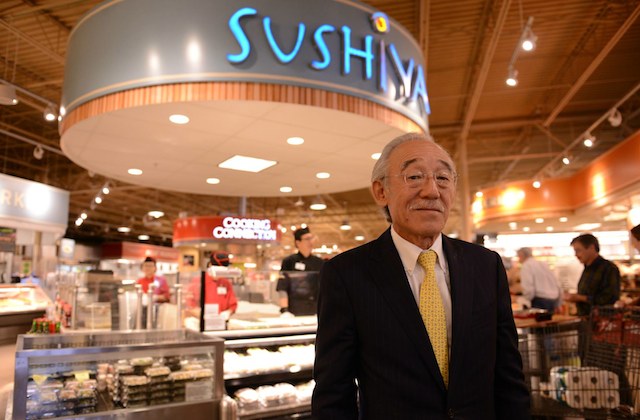"Off the Menu: Asian America," filmmaker Grace Lee’s newest food documentary is, in her words, "a food show, but not that kind of food show." Meaning: you won’t find any Ken Burnsian pans across close-up shots of glistening bowls of noodles in this film, which will premiere at CAAMFest in San Francisco on Sunday.
Instead Lee, whose previous films include "Janeane from Des Moines" and "American Revolutionary," about the activist Grace Lee Boggs, embarked on a four-state tour across the U.S. to talk with folks about their Asian-American culture, identities and communities, and the role food plays in all of it. She met a multi-generational family of octopus hunters in Hawaii, the Japanese-American man who introduced sushi to the Texas masses, and a young Chinese-American chef mining the flavors of his childhood for a new, upscale audience. There are plenty of mouth-watering shots of food and cooking in action, but that’s not what Lee’s here for.
"I’m interested in food," Lee said on a warm Los Angeles spring morning over a bowl of Thai boat noodles, "but it’s just a way to talk about other stuff." Lee’s mostly curious about food as a vehicle for Asians in America to express their cultural identities. For Jonathan Wu, a young Chinese-American chef who opened Fung Tu in New York City’s Lower East Side with his business partner Wilson Tang, that means combining his haute French cooking pedigree with inspirations found closer to home.
Wu and his friends make a classic Chinese dipping sauce traditionally used for poached chicken and steamed fish by pouring scalding hot oil over minced garlic, chives and ginger. And then they bust out with a beet salad with thousand-year-old eggs, Chinese-style sashimi, and a scallion pancake stuffed with dried fava beans and chilis, then topped with a cilantro salad and smoked chicken. It’s the kind of fare you’d never find in your local dim sum joint. "It starts with a flavor memory of eating a relative’s food, and then it gets transformed," Wu says. For the young chef, who doesn’t speak Chinese, food becomes his primary means to explore on to his cultural heritage.
Lee also visits a tofu factory and a sushi conglomerate in Houston, both churning out delightfully mind-bending Tex Mex combinations. Think overstuffed sushi rolls topped with spicy mayonnaise and Flamin’ Hot Cheetos. And vegan tofu tamales, "an Asian Tex-Mex fusion," describes Gary Chiu, vice president of the family-owned tofu company Banyan Foods.
Some might deride those mass-market creations as a reductive cheapening of refined cuisines. Instead, Lee asks viewers: What is authentic Chinese or Japanese food when you’re an Asian entrepreneur in a southern U.S. city? Differentiating the authentic good from the inauthentic crap often feels like a mean contest only the snobby play. When it comes to culture, after all, authenticity is a subjective and ever-shifting standard. Yet Lee admits in the film, and I agree, that we’re each prone to such snobbiness ourselves, especially when it comes to the respective cuisines we grew up eating and claim as our own. Still, said Lee of those Texas-based Asian food companies, "In the film, those dishes are authentic to who they are and where they’re living, and the world they’re part of."
"Off the Menu" also shows how food is much more than a product. At the Sikh Temple of Wisconsin, where a white supremacist shot and killed six worshippers in 2012, much of the temple community revolves around its langar, a tradition of serving a meal for free to all comers. Those who were killed that August day in 2012 were people who were at the gurdwara preparing the day’s meal, which usually feeds some 400 people.
"We believe the reason why food is important is because you can’t pray, and you can’t be in tune with God unless your belly is full," says worshiper Jasvir Kaur. Langar is more than a religious tradition. Everyone sits on the langar hall’s floor, and congregants cook for and serve each other–the work of making and eating the meal reinforces the bonds of the community. And, adds Kaur, "Langar particularly in this gurdwara is really amazing. They cook really elaborate food."
"Here in Los Angeles you can go anywhere in the city and experience the world without knowing anything about the people serving you or the community they come from," Lee said. "Off the Menu" is her attempt at capturing a bit of the story behind the scenes, and the people who make the food that brings so many together. And still, she said, "We haven’t even scratched the surface of Asian-American stories."
……
"Off the Menu: Asian America" premieres at CAAMFest Sunday, March 15, 2015. Click here for more information.
